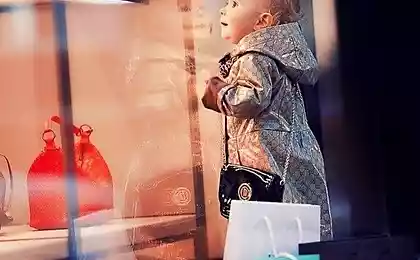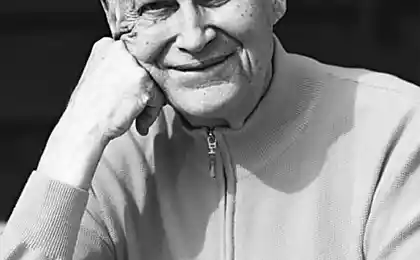756
Life for the future or Swedish approach to sustainable development
The basic principle of sustainable development is that one generation should live and act in the most "useful" to save resources for future generations. This principle has now become a way of life of the Swedes.
Sweden ranked first in the European Union for the consumption of organic food, a leader in recycling cans and bottles, and receives the largest share of its energy from renewable sources. Moreover, the world-famous Swedish fashion retailer - H & amp; M is a world leader in the use of organic cotton. Also, the government is actively involved in environmental protection, as has allocated 400 million. Swedish kronor (about US $ 54 million) on research and development of technologies to preserve the environment.
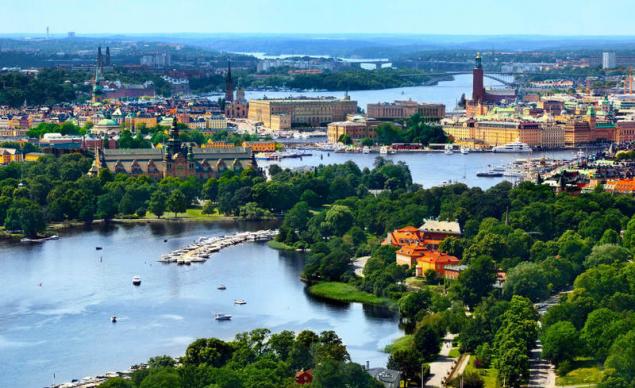
"Green" Swedes
In Europe, where the organic food market is growing 5-7 percent a year, Sweden has been a leader in the number is "green" consumers. A study conducted by the European Commission, shows that over the past months, 40 percent of Swedes have bought ekomarkovannye products, higher index than the average in Europe. In recent years, more and more stores comes from organic clothing, while the well-known manufacturers of clothing began to be used in their collections organic tissue.
Retro fashion or popularity of vintage markets.
Popularity markets second-hand clothes and shoes, both on the Internet and offline, is growing rapidly. Vintage clothing is so popular that even the stores have been made that sell vintage clothes and shoes. An example would be the Swedish company Weekday clothing, clothing stores Grandpa's, which, together with retro collections sell new clothes and shoes.
Recycling, waste, recycle!
Today the Swedes are actively involved in the recycling of garbage. 88% of bottles and aluminum cans recycled. processing garbage Returpack Statistics Swedish company proves that the Swede in the total returns 146 cans and bottles, for which he receives a deposit. Today, such a waste processing company Returpack are making a lot of effort to get people to recycle more rubbish: they double the size of the deposit for containers, remove advertising campaigns with the involvement of well-known people who sing, dance, and at the same time calling to recycle more rubbish
.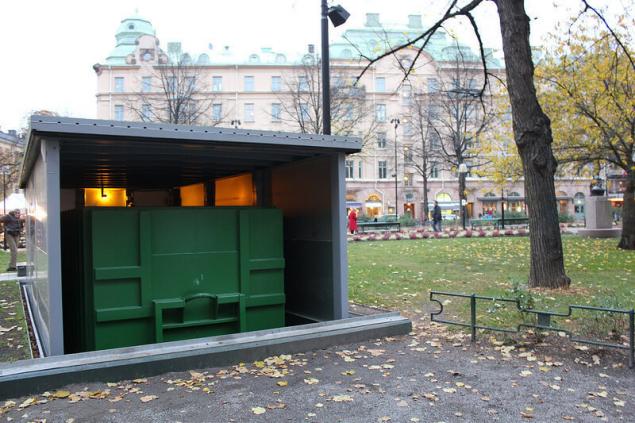
In 2012, 2.27 million tons of waste were burned and converted into energy for the first time in Sweden, built a plant for the incineration of waste in 1904. At present, there are a 32 factory, which produce heat and heat more than 810 000 households and 250 000 private houses.
Interesting also is used as a waste: paper, for example, are converted into paper, plastic containers become the raw material for the subsequent production, food waste - biogas or soil after a complicated chemical processing. Buses, garbage trucks usually run on electricity or processed biogas. Tainted water is purified to such an extent that it becomes once again safe to drink. Special trucks drive around the city and collect electronics and hazardous waste (chemicals, medicine residues). The campus, where we live, there is not just a special area for different types of waste (organic, plastic, metal, paper), for large debris, such as furniture, and there is a special room, where left broken appliances and batteries. That is, all are trained to care for the environment, even students.
"Green" vehicles.
In 2011, the Swedish government has appointed a special controller to follow the rules that affect the use of bicycles. In addition, the Swedish Transport Agency, in collaboration with other government agencies have developed an action plan to improve the use of bicycles. City of Malmö has been recognized by the city, in the development of cycling as one of four trips in Malmö - bicycle
. Trains.
Trains state company SJ «eat» electricity. For its trains in Sweden, SJ buys only renewable electricity from hydropower or wind energy. This means that the production of electricity for trains is carried out with minimal emissions. All trips using SJ trains meet the requirements of the organization Swedish Society for Nature Conservation.
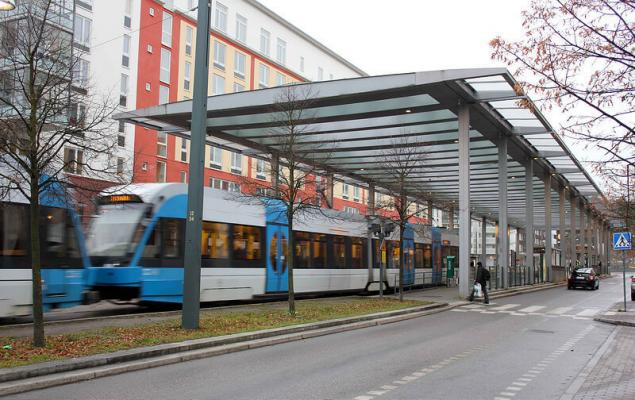
Concerning public transport in Stockholm, then 98% of the new trams running to the city to be recycled, the metro runs on "green" electricity, that is, one which is produced using environmentally friendly technologies. Since 2009, part of the buses running on biogas, and the other - on ethanol, the aim is by 2025 to convert all public buses in
«green». Buildings "bask" energy people.
Since more than 40% of the total consumption of Power is used for heating of housing and services, one of the ways to reduce consumption - it is to create a low-energy residences. These homes are called "passive", because the work at the expense of the energy that is already there, such as the energy from the body heat of people, electrical appliances, lighting and sunlight. These houses were built across Sweden, including Stockholm, Göteborg, Västerås and Helsingborzi. In autumn 2011, the first Nordic Ecolabel apartment house built in Stockholm. The building (36 apartments) produces half the carbon dioxide emissions than conventional residential dom.Soglasno survey conducted by the construction company Veidekke, 7 out of 10 Swedes want to live in such a clean home and are willing to pay more for it.
Finally, if you are interested in "sustainable development" and want to learn it, then pay attention to the following features:
Chalmers University of Technology, in which a lot of faculties, directions for the study relating to environmental issues. The University is part of the Alliance for Global Sustainability - an international partnership between Chalmers University of Technology, Massachusetts Institute of Technology, Tokyo University and the Swiss Technical School in Zurich
. Royal Institute of Technology, which is one of the leading European institutes of technology for education and research in the field of the Environment and Sustainable Development. The university even appointed vice-president of sustainable development and a new environmental director.
Have you thought about how much energy consumes light in your kitchen, what happens to the batteries, you have thrown in the trash or why the kettle has a scum on the water from the tap?
Sweden ranked first in the European Union for the consumption of organic food, a leader in recycling cans and bottles, and receives the largest share of its energy from renewable sources. Moreover, the world-famous Swedish fashion retailer - H & amp; M is a world leader in the use of organic cotton. Also, the government is actively involved in environmental protection, as has allocated 400 million. Swedish kronor (about US $ 54 million) on research and development of technologies to preserve the environment.

"Green" Swedes
In Europe, where the organic food market is growing 5-7 percent a year, Sweden has been a leader in the number is "green" consumers. A study conducted by the European Commission, shows that over the past months, 40 percent of Swedes have bought ekomarkovannye products, higher index than the average in Europe. In recent years, more and more stores comes from organic clothing, while the well-known manufacturers of clothing began to be used in their collections organic tissue.
Retro fashion or popularity of vintage markets.
Popularity markets second-hand clothes and shoes, both on the Internet and offline, is growing rapidly. Vintage clothing is so popular that even the stores have been made that sell vintage clothes and shoes. An example would be the Swedish company Weekday clothing, clothing stores Grandpa's, which, together with retro collections sell new clothes and shoes.
Recycling, waste, recycle!
Today the Swedes are actively involved in the recycling of garbage. 88% of bottles and aluminum cans recycled. processing garbage Returpack Statistics Swedish company proves that the Swede in the total returns 146 cans and bottles, for which he receives a deposit. Today, such a waste processing company Returpack are making a lot of effort to get people to recycle more rubbish: they double the size of the deposit for containers, remove advertising campaigns with the involvement of well-known people who sing, dance, and at the same time calling to recycle more rubbish
.

In 2012, 2.27 million tons of waste were burned and converted into energy for the first time in Sweden, built a plant for the incineration of waste in 1904. At present, there are a 32 factory, which produce heat and heat more than 810 000 households and 250 000 private houses.
Interesting also is used as a waste: paper, for example, are converted into paper, plastic containers become the raw material for the subsequent production, food waste - biogas or soil after a complicated chemical processing. Buses, garbage trucks usually run on electricity or processed biogas. Tainted water is purified to such an extent that it becomes once again safe to drink. Special trucks drive around the city and collect electronics and hazardous waste (chemicals, medicine residues). The campus, where we live, there is not just a special area for different types of waste (organic, plastic, metal, paper), for large debris, such as furniture, and there is a special room, where left broken appliances and batteries. That is, all are trained to care for the environment, even students.
"Green" vehicles.
In 2011, the Swedish government has appointed a special controller to follow the rules that affect the use of bicycles. In addition, the Swedish Transport Agency, in collaboration with other government agencies have developed an action plan to improve the use of bicycles. City of Malmö has been recognized by the city, in the development of cycling as one of four trips in Malmö - bicycle
. Trains.
Trains state company SJ «eat» electricity. For its trains in Sweden, SJ buys only renewable electricity from hydropower or wind energy. This means that the production of electricity for trains is carried out with minimal emissions. All trips using SJ trains meet the requirements of the organization Swedish Society for Nature Conservation.

Concerning public transport in Stockholm, then 98% of the new trams running to the city to be recycled, the metro runs on "green" electricity, that is, one which is produced using environmentally friendly technologies. Since 2009, part of the buses running on biogas, and the other - on ethanol, the aim is by 2025 to convert all public buses in
«green». Buildings "bask" energy people.
Since more than 40% of the total consumption of Power is used for heating of housing and services, one of the ways to reduce consumption - it is to create a low-energy residences. These homes are called "passive", because the work at the expense of the energy that is already there, such as the energy from the body heat of people, electrical appliances, lighting and sunlight. These houses were built across Sweden, including Stockholm, Göteborg, Västerås and Helsingborzi. In autumn 2011, the first Nordic Ecolabel apartment house built in Stockholm. The building (36 apartments) produces half the carbon dioxide emissions than conventional residential dom.Soglasno survey conducted by the construction company Veidekke, 7 out of 10 Swedes want to live in such a clean home and are willing to pay more for it.
Finally, if you are interested in "sustainable development" and want to learn it, then pay attention to the following features:
Chalmers University of Technology, in which a lot of faculties, directions for the study relating to environmental issues. The University is part of the Alliance for Global Sustainability - an international partnership between Chalmers University of Technology, Massachusetts Institute of Technology, Tokyo University and the Swiss Technical School in Zurich
. Royal Institute of Technology, which is one of the leading European institutes of technology for education and research in the field of the Environment and Sustainable Development. The university even appointed vice-president of sustainable development and a new environmental director.
Have you thought about how much energy consumes light in your kitchen, what happens to the batteries, you have thrown in the trash or why the kettle has a scum on the water from the tap?




















